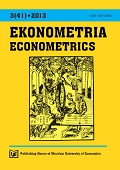On the non-monetary benefits of tertiary education
On the non-monetary benefits of tertiary education
Author(s): Anna Izabella Król, Marta Dziechciarz-DudaSubject(s): Economy
Published by: Wydawnictwo Uniwersytetu Ekonomicznego we Wrocławiu
Keywords: rate of return on tertiary education; non-monetary returns on tertiary education; private non-market effects; community non-market effects
Summary/Abstract: There is a need to measure the efficiency and effectiveness of higher education in its various aspects, including the area of non-monetary benefits of higher education. Education relates to the wider economic and social effects and human welfare depends partly on earnings but also on non-monetary outcomes that all trace back to education in various ways. There exist positive relationships between education and health, the health of family members, the schooling of one’s children, life choices made, fertility choices and infant mortality. Increasing the education level also has a positive effect on the environment and has a strong influence on crime reduction. The article is a review of the impact of the intangible benefits of higher education, particularly non-monetary private and the social rates of return on investment in education. Empirical studies are carried out on data from the Social Diagnosis2 2011.
Journal: Ekonometria
- Issue Year: 2013
- Issue No: 41
- Page Range: 78-94
- Page Count: 17
- Language: English

